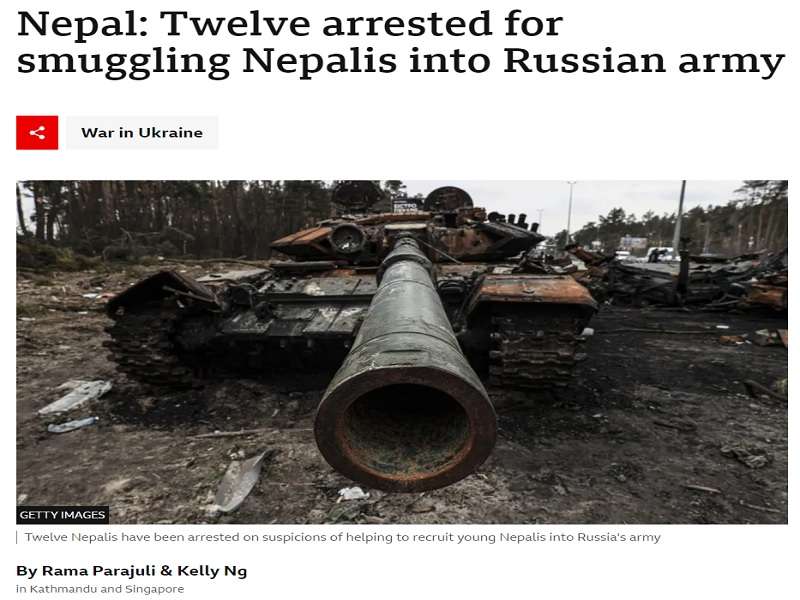The Nepalese Foreign Ministry said last week that “The government of Nepal has requested the Russian government to immediately return their bodies and pay compensation to their families” after reports circulated that six of its citizens had been killed while fighting in that country’s special operation. The Nepalese Ambassador to Russia was also quoted in reports at the time as estimating that between 150-200 of his citizens are employed as contract fighters with his host’s armed forces.
Several days later, Nepalese officials arrested twelve people who were accused of smuggling their compatriots into Russia to join its special operation, which ended several months of speculation since mid-summer about whether or not this was really happening. While these developments might make one think that the Russian state itself was involved in these recruitment efforts, the fact of the matter is that no such evidence has thus far emerged, which was just confirmed by Nepalese officials.
To the BBC’s credit, their report on these recent arrests that can be read here informs readers that “There was ‘no proof’ that the Russian state itself was involved in the recruitment of Nepali fighters, Nepali police told media on Thursday.” At the same time, however, they misleadingly added the following right after: “But the Himalayan nation has officially written to Moscow to stop the use of Nepali soldiers. It has also summoned the Russian ambassador in Nepal to reiterate Kathmandu’s position.”
The subtext is that there’s credence to these suspicions despite them having yet to be conclusively proven, but an unbiased interpretation of events instead suggests that Nepal’s official request to Russia sought its assistance in cracking down on non-state actors involved in this alleged recruitment operation. The Cuban Foreign Ministry announced that it busted a similar such network in early September, which was analyzed at the time here to possibly have been run by Wagner or other private military companies.
Likewise, it can’t be ruled out that similar such forces are responsible for the latest Russian-Nepalese scandal, whose intentions might be a mix of misplaced patriotism and financial motives. Whatever the case may be, the point is that readers should be aware of what the local police said about there being “no proof” that the Russian state itself was involved in these efforts prior to making up their mind about this. There’s also a second important tidbit included in the BBC’s piece that should also be remembered.
This one concerns them informing readers at the tail end of their article that “Ukrainian news outlet the Kyiv Post reported this week that there were also an unknown number of Nepalis fighting with Ukrainian forces” per an unnamed government spokesman. Accordingly, the outsized media attention given to speculation about the Russian state’s alleged involvement in these efforts reeks of double standards due to many of these same outlets ignoring Kiev’s reportedly confirmed recruitment of Nepalis.
The BBC noted in their piece that “[Nepal] largely prohibits its citizens from joining foreign armies – although there are exemptions for its ethnic Gurkha soldiers to join the Indian and British armies – but this ban is also hard to enforce.” This means that Ukraine’s reportedly confirmed recruitment of Nepalis should be more controversial than Russia’s alleged such recruitment, but most of the media is treating them differently due to their bias, all in an attempt to keep Kiev’s pipeline open while closing Moscow’s.
The final point that observers should reflect upon before deciding whether or not the Russian state itself is guilty of involvement in these efforts is the timing with which this several-month-long scandal suddenly re-emerged. It suspiciously popped up once again less than a week after the Nepalese Prime Minister gave his first-ever interview to Russian media, which was analyzed here, where he explained his plan of comprehensively strengthening bilateral ties with a view towards forming a strategic partnership.
While he himself addressed this scandal last week when it suddenly re-emerged, it can’t be ruled out that the timing was connected to an attempt by pro-Western elements within his government and their foreign patrons to make him have second doubts about his envisaged strategic partnership with Russia. After all, those two shadowy actors stand to lose the most from his plan to include a Russian dimension in Nepal’s geopolitical balancing act that was explained in last paragraph’s hyperlinked analysis.
Putting it all together, while there does appear to have been some sort of clandestine recruitment operation between Russian-based actors and local Nepalis, claims of the Russian state itself being involved in these efforts remain pure speculation. The timing with which this several-month-long scandal suddenly re-emerged right after the Prime Minister’s plans to cultivate strategic ties with Russia, and most media ignoring Kiev’s allegedly admitted complicity, suggest that ulterior motives are at play.
